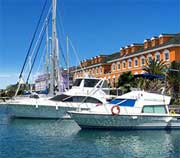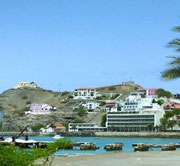Inheritance tax and inheritance law in Cape Verde
The Global Property Guide looks at inheritance from two angles: taxation, and what inheritance laws apply to foreigners leaving property in Cape Verde: what restrictions there are and whether making a will is advisable.
INHERITANCE
Although there are no inheritance taxes in Cape Verde, any property transmitted by inheritance or by gift is subject to property tax.
Property owners are advised to execute a will in Cape Verde once they have acquired the property. Although foreign wills are valid, obtaining probate is easier if there is a local will.
Property Tax (imposto único sobre o património)
Beneficiaries receiving Cape Verde property are liable to pay property tax, which is levied on the property value at a flat rate of 1.50%.
INHERITANCE LAW
Thanks to Gabinete de Advocacia Consultoria e Procuradoria Juridica
What inheritance laws apply in Cape Verde?
In the case of property inheritance in Cape Verde, the applicable law is that where the property is located.
With the exception of mainly political rights, foreigners and stateless persons residing in Cape Verde enjoy the same rights, liberties and guarantees, and are subject to the same duties as Cape Verdean citizens. In terms of property rights, foreigners are accorded the same treatment as nationals, regardless of their nationality or religion.

Inheritance issues of a foreigner with assets in Cape Verde are regulated by the law of his/her nationality at the time of death. The personal law of the foreigner defines the powers of the administrators of the inheritance, as well as the capacity to establish, modify or revoke wills or other instruments of succession. If the legislation of the foreigner´s nationality refers inheritance issues back to Cape Verde, then Cape Verdean internal law becomes applicable.
However, for the more simple case of regulating the regime of possession or property rights, excluding family or successor relations, then the applicable law is that of the country where the property is located.
Cases regarding inheritance and succession in Cape Verde are resolved by common judicial trial courts, with the right to appeal to the Supreme Court of Justice.
A reserved or legitimate portion exists.
In Cape Verdean law, the testator cannot dispose of that portion of his/her property which is legally destined to two classes of "necessary heirs":
- The descendents.
- The second class comprises the spouse and ascendants.
The heirs in each class have preference over the next. Within each class, the closer relatives have preference over more distant ones i.e. descendants have preference over ascendants. If children are the heirs, then grandchildren are excluded. Grandchildren are only considered as heirs if no children are alive. The same goes for the second class: parents are considered heirs in preference to grandparents.
When there is only one son or daughter, the reserved or legitimate portion is half the inheritance. When there are two or more sons or daughters, their collective legitimate portion is two thirds. When only the spouse or ascendants survive, their legitimate portion equals half of the inheritance. When both survive, then the legitimate portion of the spouse and the ascendants is two thirds of the inheritance.
Apart from the legitimate portion, the testator may freely dispose of his/her property in a will, to become effective after death.
In the absence of a will, the ´rules of legitimate succession´ apply.
If the owner of the inheritance dies intestate, the rules applied are those of legitimate succession established in article 2059 and subsequent articles of the Civil Code. In this case, the following heirs are considered in line of succession, in sequential order:
- 1º Descendents;
- 2º Spouse and ascendants:
- 3º Siblings and their descendants;
- 4º Other collateral relatives up to fourth degree kinship;
- 5º The State.

Closer relatives (example, relatives of 1st, 2nd degrees) have preference over more distant ones (3rd and 4th degrees).
The inheritance is divided into equal parts among the sons and daughters. In the absence of descendants, the spouse has the right to half the inheritance and the ascendants have the right to the other half. In the absence of ascendants, the spouse has the right to the whole inheritance, but in the absence of a spouse the ascendants have the right to the total inheritance.
The surviving spouse has the right to reside in the family´s residential property and to use the furnishings, whether they belonged to the deceased, or are the couple´s common property. However, if the rights reserved to the surviving spouse exceed the spouses´ successor portion or marriage portion, then the surviving spouse must make due compensation to the heirs.
Making a will is advantageous.
The advantage of making a will, either in Cape Verde, or in the country of the testator´s nationality, is that a foreigner can dictate the disposal of his/her possessions in Cape Verde. Otherwise, succession may not be according to the foreigners´s wishes, but according to the legitimate succession rules of Cape Verde.
In Cape Verde, a will must be written and signed directly by the testator, or by a third person, upon request from the testator, in the presence of a notary officer. Wills cannot be made through representation, for example, through a lawyer.
Assets in Cape Verde can be donated during the lifetime of the owner.
The only restriction is Article 242 of the Civil Code, which provides legitimate heirs the right to challenge the validity of assets which were donated with the intent of harming them. If assets are common property of a couple, for example, a spouse needs the other spouse´s consent, in order to donate such property, or be punished by law.
Three regimes of marital property exist.
Cape Verdean law provides for the property rights of married persons. Couples getting married can choose one of three possible regimes of marital property: separation of property; community of acquired property; or community of general property.
- In the separation of property regime, each spouse maintains the domain and use of all his/her present and future assets, and may freely dispose of them.
- In the community of acquired property regime, all property belonging to each one of the spouses at the time of marriage, property acquired after marriage by succession or donation as well as property acquired in marriage that is not considered an exception by law, is considered owned by each spouse separately.
- In the general community of property regime, the couples own in common all property belonging to each at the time of marriage, as well as all property acquired in the future and which is not excluded by law.
 Guardians can be appointed to take care of the interests of children.
Guardians can be appointed to take care of the interests of children.
In their will, or other authentic document, parents can, in the case of their death, appoint a legal guardian to take care of the interests of their surviving child, or children, who are not of legal age. If a legal guardian is not appointed by the parents, the court can appoint a guardian after hearing the family council, which includes the child´s relatives and other people who have cared for or have shown affection for the child.